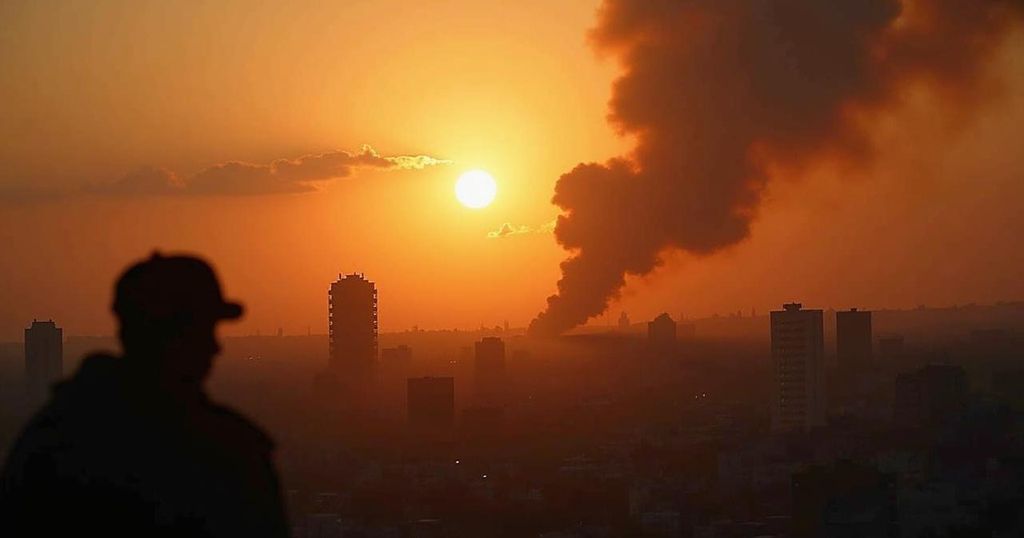Israeli airstrikes have intensified in Beirut and Tripoli as part of ongoing military actions against Hezbollah and Hamas. This escalates the already critical situation stemming from the Israel-Gaza conflict initiated on October 7, 2023, following a deadly Hamas attack. International reactions, including calls from French President Emmanuel Macron for an arms embargo to Israel, complicate the geopolitical climate, as humanitarian conditions in Gaza worsen amidst continued U.S. support for Israel.
Israeli airstrikes targeted Beirut overnight, as the Israel Defense Forces (IDF) claimed responsibility for striking Hezbollah positions. Reports from Hezbollah’s affiliated television channel, Al-Manar, indicated that the southern suburbs of Beirut experienced significant bombardment, resulting in substantial fires and smoke plumes. Additionally, Israeli assaults extended to Tripoli in northern Lebanon, where Hamas officials announced the death of one of their field commanders. In the backdrop of this escalating conflict, French President Emmanuel Macron urged the international community to cease arms supplies to Israel amid the ongoing hostilities in Gaza. The conflict between Israel and Hamas commenced on October 7, when Hamas launched a coordinated cross-border offensive against Israel, resulting in the deaths of approximately 1,200 individuals and the capture of civilian hostages. This prompted a robust military response from Israel, which declared war on Hamas and initiated a ground offensive leading to widespread displacement throughout the region. Notably, in July 2024, a key Hamas leader, Ismail Haniyeh, was reported killed in an assault attributed to Israeli forces. Hostilities with Hezbollah, a militant faction supported by Iran, have intensified significantly over the past year, culminating in an Israeli invasion of southern Lebanon. These airstrikes have reportedly resulted in over 1,400 casualties in Lebanon, including the deaths of prominent Hezbollah leaders. The Israel-Lebanon border has long been a tumultuous area, characterized by repeated violence and conflict. The humanitarian situation in the Gaza Strip has deteriorated alarmingly, with Israel conducting one of the most catastrophic military campaigns of the century. Casualties have reached tens of thousands, and approximately half of Gaza’s population is facing conditions akin to famine. Despite substantial pressure from international allies to increase humanitarian aid to the beleaguered enclave, Israel has remained resistant to such measures. The United States has maintained its supportive stance towards Israel, notwithstanding tensions between Israeli Prime Minister Benjamin Netanyahu and various U.S. political figures, including President Biden. The U.S. continues to provide military assistance, financial support, and has historically exercised its veto power against United Nations resolutions advocating for cease-fires in the conflict between Israel and Hamas. The Israeli-Palestinian conflict is underpinned by a complex and deeply-rooted historical narrative that predates the establishment of the State of Israel in 1948, further complicating the longstanding animosities in the region.
The ongoing conflict between Israel and Hamas, as well as the broader tensions with Hezbollah and the implications for Lebanon, are part of a larger narrative involving historical disputes and regional power dynamics. The Israeli-Palestinian conflict has complex roots influenced by territorial claims, national identities, and international politics. The latest escalation in violence follows Hamas’s surprise attack on Israel in October 2023 and Israel’s subsequent military responses, which have drawn international scrutiny and humanitarian concerns, particularly regarding Gaza’s dire conditions. This cycle of violence not only affects Israel and Palestine but reverberates throughout the Middle East, involving various state and non-state actors including Hezbollah, which operates mainly in Lebanon.
The recent airstrikes by Israel in Beirut and the northern expansion into Tripoli highlight the escalating conflict involving Hezbollah and Hamas amidst the ongoing war in Gaza. The humanitarian crisis in Gaza has reached alarming levels, while the U.S. continues to back Israel despite mounting international pressure for a ceasefire and increased aid. As the regional dynamics shift, understanding the historical context and the motivations of the various actors involved is crucial for grasping the complexities of this multifaceted conflict.
Original Source: www.washingtonpost.com







